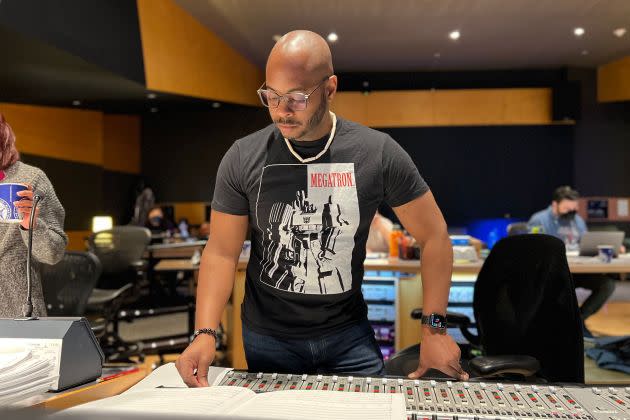Why the ‘Rise of the Beasts’ Composer Spent Two Years Scoring the Revved-Up Return of ‘Transformers’
- Oops!Something went wrong.Please try again later.
- Oops!Something went wrong.Please try again later.

On the scoring stage at 20th Century-Fox studios in Burbank, composer Jongnic Bontemps is walking around in a “Transformers: The Movie” T-shirt – that’s the animated cartoon from 1986, not the $200-million summer blockbuster he’s just scored.
“Violins, play a little softer,” he tells the musicians via intercom from the glass booth behind the stage. “It has to be emotional.” Later, after a rehearsal on a different cue, he tells the string players, “It needs to feel like a warm blanket.”
More from Variety
Bontemps is making movie history. He has just spent two years writing the music for “Transformers: Rise of the Beasts,” the seventh in the big-screen franchise, and he’s supervising the recording of the final pieces of the score with a 74-piece orchestra. The film opens Friday.
Bontemps is believed to be the first African-American composer to score such an expensive studio movie. Yet he’s been working with director Steven Caple Jr. since they met at USC students in 2011 – Caple in the cinema school, Bontemps in the scoring program – and Caple argued for Bontemps as a composer when he took over the seventh film in the “Transformers” franchise.
It wasn’t easy convincing Paramount to risk a big summer movie on a composer whose most high-profile credits are documentaries (“Citizen Ashe,” “My Name Is Pauli Murray”) and a Netflix rom-com (“Wedding Season”).
Bontemps actively sought the job and took nothing for granted. He wrote 10 minutes of music he thought might be appropriate for a “Transformers” epic and recorded it with a 40-piece orchestra at his own expense. That April 2021 recording, his demo, met with no response.
“It was an involved choice,” says Paramount music president Randy Spendlove. “We considered dozens of composers. It’s a very big franchise with a long history. Part of it was, do we want to look forward, and think about where the franchise has been and where it’s going? It really came down to trying to be forward-thinking. J.B.’s relationships and diverse background played a role, but ultimately it was about finding a composer that understood the material.”
Months went by as Caple was off shooting in Montreal and Peru. Finally, in November 2021 — with Paramount having moved the film’s release date to June 2023, thereby providing many more months of post-production – Bontemps was offered the task, but with a caveat: He was asked to do his work on the Paramount lot.
“While you want to give people opportunity, you also want to set people up for success,” Spendlove said. “The first step was to build a state-of-the-art recording studio right on the lot.”
Starting in February 2022, Bontemps was working in the same building as the director, the editors and the post-production supervisor – unlike the usual situation where composers work in their own private studios and deliver music to the editors and directors, sometimes only meeting over Zoom or otherwise remotely.
They experimented with different musical styles, Bontemps said. They went heavy on electronics at one point, then “a more sound-design path that didn’t serve the film as well. Even though we have this amazing CGI and the robots feel so real, that human element, the emotional element, can really be supported by the music.”
Bontemps said they quickly realized that “an organic, orchestral, emotional score, that sound we are all familiar with, and has such a deep history, goes a long way for we as the audience to connect with these robots.” Strings, brass and a substantial percussion section, combined with some electronics and what Bontemps calls “the grooves of Brooklyn,” forms the basis of the “T7” score.
The film’s unusual settings dictated two key elements: 1994 Brooklyn, where Noah (Anthony Ramos) and Elena (Dominique Fishback) partner with Optimus Prime and his Autobots to stop Scourge and his Terrorcons from obtaining a powerful ancient artifact; and Peru, where the Autobots team with Maximals, a group of beast-robots from another planet, to battle the Terrorcons.
Bontemps was born in Brooklyn and knows that beat – “the sound of hip-hop, the 808 drum machine, having those syncopated rhythms and grooves that I grew up around, coming out of radio.” For Peru, he delved into Afro-Peruvian traditions and hired world-class soloists including Peruvian-born percussionist Alex Acuna, Mexican-born Abraham Laboriel on guitarron and charango, Venezuelan-born Pedro Eustache on Latin woodwinds, and Peruvian-born composer Erick Del Aguila as a consultant.
In search of more unique sounds, he employed the rare brass tubax, a modified contrabass saxophone; and a drum set built almost entirely out of rubber tires.
As Bontemps was nearing completion of his 110-minute score, Paramount brought on Steve Jablonsky, the composer of the first five “Transformers” scores, as a consultant and producer. “He was really wonderful in helping me craft some of this music and really think about how it should play in the entire soundscape of the film,” Bontemps said.
He’s especially proud of the diverse team that he assembled to orchestrate, program and record the score. As a guest in the studio remarked: “I have never seen two African-Americans and an Asian woman at the board leading a session like this.”
Bontemps has plenty of experience putting teams together. Long before he switched careers to follow his dream of writing music for films, he was leading multi-million-dollar projects for software companies. And he apprenticed as a programmer and tech troubleshooter for such A-list composers as Alexandre Desplat and Alan Silvestri.
Adds Spendlove: “J.B. has brought his authentic self, something really new, really refreshing, to the sound of this legendary franchise.”
Best of Variety
Sign up for Variety’s Newsletter. For the latest news, follow us on Facebook, Twitter, and Instagram.
